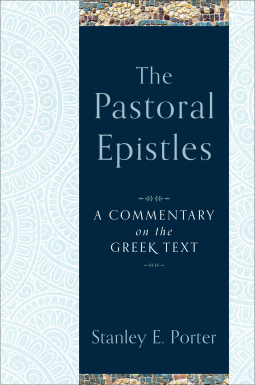
The Pastoral Epistles
A Commentary on the Greek Text
by Stanley E. Porter
This title was previously available on NetGalley and is now archived.
Send NetGalley books directly to your Kindle or Kindle app
1
To read on a Kindle or Kindle app, please add kindle@netgalley.com as an approved email address to receive files in your Amazon account. Click here for step-by-step instructions.
2
Also find your Kindle email address within your Amazon account, and enter it here.
Pub Date 17 Oct 2023 | Archive Date 2 Jan 2024
Baker Academic & Brazos Press | Baker Academic
Talking about this book? Use #ThePastoralEpistles #NetGalley. More hashtag tips!
Description
This book breaks new ground in its interpretation of these controversial letters by focusing on the Greek text and utilizing a linguistically informed exegetical method that draws on various elements in contemporary language study. Porter pays attention to the overall argument of the Pastoral Epistles while also analyzing word meanings and grammatical structures to tease out the textual meaning. Porter addresses major exegetical issues that arise in numerous highly disputed passages and--while attentive to the history of scholarship on First Timothy, Second Timothy, and Titus--often takes untraditional or innovative positions to blaze a new path forward rather than adopt settled answers.
This commentary will appeal to professors, students, and scholars of the New Testament.
Advance Praise
“Porter’s commentary on the Pastoral Epistles is one of the most, if not the most, detailed grammatical commentaries on the Greek text. This commentary exhibits Porter’s signature approach to Systemic Functional Linguistics and offers a plethora of new insights for scholarly discussion.”—Craig S. Keener, F. M. and Ada Thompson Professor of Biblical Studies, Asbury Theological Seminary
“Porter writes a different kind of commentary for the Pastoral Epistles, one devoted to an accessible linguistic interpretation of the Greek that helps the reader understand the language of the texts and their situational context. While focusing on insights at the clause level, he also sheds new light by bringing linguistic theory and the data of the texts to bear on the critical issues and the notorious interpretive problems of these controversial and intriguing letters.”—Cynthia Long Westfall, associate professor of New Testament, McMaster Divinity College
“This is the most thorough commentary in English since the 1999 commentary by Marshall. The introduction is itself a reason to buy this commentary. Porter’s vast knowledge of linguistics and primary and secondary sources is on display in this magnificent commentary, which I suspect will become the standard for the exegesis of the Greek text.”—Osvaldo Padilla, professor of divinity, Beeson Divinity School
“This is a much-needed book on a contentious group of writings. Porter sheds fresh light on the Pastoral Epistles and the issues surrounding them, especially authorship, by applying a consistent and rigorous linguistic model (Systemic Functional Linguistics) and placing emphasis where it belongs, on the Greek text. No one will want to study these books without recourse to Porter’s meticulous, judicious, and thought-provoking work. Get this book, and refer to it often.”—David L. Mathewson, associate professor of New Testament and chair of the New Testament department, Denver Seminary
“This is not just one commentary among many but a unique commentary on the Greek text of the Pastoral Letters. It is intensive and detailed (clause by clause, not word for word, explaining the meanings in context), consistent (based on the linguistic method, Formal Systemic Functional Grammar, explained in the prolegomenon), thorough and encyclopedic (discussing the opinions of other commentators), and extensive (about 1,000 pages). Its language is accessible to the average reader, avoiding technicalities as much as possible. This is a commentary full of original interpretations that presents a new and comprehensive reading of the Pastoral Letters.”—Jesús Peláez, professor of Greek philology, University of Córdoba, Spain
“If Mount Rushmore honored great and recent English-language commentaries on the Pastorals, alongside the works of I. Howard Marshall, Philip Towner, and Gerald Bray would now appear this offering by Stanley E. Porter. Through rigorous application of Formal Systemic Functional Grammar, Porter sets forth a reading that will provoke and inform constructive discussion for years to come, not least because of conclusive arguments advanced for Pauline authorship.”—Robert W. Yarbrough, professor of New Testament, Covenant Theological Seminary
Available Editions
| EDITION | Other Format |
| ISBN | 9780801027185 |
| PRICE | $70.00 (USD) |
| PAGES | 1008 |
Available on NetGalley
Average rating from 3 members
Featured Reviews
 Rosa S, Educator
Rosa S, Educator
The delightful thing about this volume is that how comprehensive and engaging it feels. When I preach, I want to be certain not to make up things or read impossibilities into the text. This is my new guidebook to the Pastoral Epistles.
For a linguist interested in details for accurate translation, the phrase by phrase, in context treatment of these letters is a pleasure. This book offers insights into how the language was normally used as well as innovations of use and form by New Testament writers.
For a preacher like me, it offers a breadth of background, dictionary, lexicon, and function. I've long ago left my Hebrew and NT Greek classes behind, as have so many Bible and theology students. To have a gifted scholar teach us and remind us of structure, culture, and meaning is a true gift. It will change what you say to your congregation and classroom as well as how you say it. My husband is a theology prof so he'll be picking up a copy as well.
Highly recommended.
The work of a pastor is an exceedingly difficult one. Somehow a pastor must simultaneously be a theologian, a grief counselor, an expert on reading ancient texts, an arbitrator of intramural disputes, a voracious reader, a gifted orator, a fount of wisdom for the young, a charming wedding officiator, and more—all while being fully present in family life and personal relationships.
It is because of this impossible load that, when I hear sermons asserting absolutely absurd things about the grammar of the biblical text (Anyone ever heard the argument for the trinity from Genesis 1:27?), I heap grace upon that preacher. My assumption is that what I'm hearing is a good faith effort to teach the text and proclaim the glory of the gospel message, and that this can happen even in the face of missteps, mistakes, and errors with the text.
All that said, it's highly likely that you have heard a sermon in your life where the preacher has attempted to make a theological point solely from the Greek grammar of a New Testament text. That might sound something like this: "Paul's verb here is in the past tense, which means that this is a once-and-for-all action and that Christ's work is complete!" I give grace for this kind of mistake (it really is a difficult skill to take accurate scholarly work and make it accessible), but it still drives me bonkers. The solution, I think, is not only more rigor in seminaries and Bible colleges, but also better resources for pastors.
Stanley Porter's newest commentary on the pastorals is exactly this kind of resource. It is exacting in its attention to every textual detail, bringing the most cutting edge linguistic tools to bear upon the work of making sense of these three letters. His laser focus on grammar and semantics means that he rarely offers his opinion on what implications the text does or doesn't have for modern audiences. I find his use of Systemic Functional Linguistics to be particularly helpful in illuminating the contours of Paul's discourse and in foregrounding his emphases. It also means that he does not make much of historical-cultural data (except here and there where he claims that people use it to read too much into the text!). I'm not a scholar that I can rightly disagree with Porter, but suffice it to say that I find other readings of challenging verses such as Sandra Glahn's take on 1 Timothy 2:15-3:1 (https://benmakuh.com/2023/06/nobodys-mother/) to be far more persuasive than his precisely because it weighs the linguistic data in balance with other relevant material.
That's not to say that this volume is unhelpful—quite the contrary! It's merely to say that it's worth it to pair his meticulous linguistic work with other scholarship in the work of understanding the text. I personally spend quite a bit of time in the pastorals, and I'm certain that I'll make good use of this commentary. I heartily recommend it!
DISCLAIMER: I received a copy of this book from the publisher for the purpose of a fair, unbiased review.
 Reviewer 1154977
Reviewer 1154977
Intended for pastors and academics, this comprehensive work will be a valuable resource for those wanting to further investigate the context of 1st and 2nd Timothy and Titus with particular focus on language and grammar.
While I haven't made it thru all the book, I have enjoyed reading sections on specific portions of these Epistles to gain a more informed perspective. I find it's particularly helpful when I'm reading other books and want to compare academic understanding of the text to a lay-person interpretation.
Thank you for early digital copy Brazos Press. This will surely be a grrat resource for teachers, leaders, amd pastors for years to come.
Readers who liked this book also liked:
We Are Bookish
Biographies & Memoirs, Health, Mind & Body, Nonfiction (Adult)
Robert Williamson Jr.
Christian, Nonfiction (Adult), Religion & Spirituality







